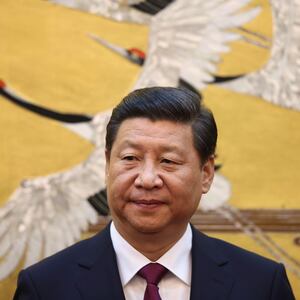The new defense alliance between Australia, the United States, and Great Britain to provide Canberra with state-of the art technology for a fleet of nuclear attack submarines amounts to a major setback for Beijing’s long-term goal of achieving strategic dominance in the Indo-Pacific region. The alliance—AUKUS for short—also amounts to a significant step forward for the Biden administration’s effort to frustrate China’s military ambitions, and to address the very sobering challenges posed by Beijing’s remarkable rise over the last decade.
The presence of the Aussie subs, which will not carry nuclear weapons but conventional cruise missiles, will go far toward addressing the erosion of America’s military deterrence in the region that experts say has only encouraged China to take a far more assertive stance in regional affairs than it ever has before.
Since about 2013, the People’s Republic of China has been pursuing a foreign policy designed to sever the economic and security ties between the United States and other nations in the region, including America’s longstanding allies Japan and South Korea, and to challenge American naval supremacy in the Western Pacific and Indian oceans. Zhao Lijian, a spokesman for the Chinese Ministry of Foreign Affairs, pronounced the new deal, which will lead eventually to a fleet of highly sophisticated Australian subs operating in international waters Beijing now brazenly claims as its own, would “seriously damage regional peace and stability, exacerbate an arms race, and harm nuclear non-proliferation efforts.”
Yet the meltdown in relations between the two Asia-Pacific countries that precipitated the deal exposes rather graphically the “seamy underbelly” of China’s vision of the future of the region. Just six years ago, Australia was at the epicenter of President Xi Jinping’s bold new foreign policy of “peaceful rise and development,” the goal of which, said the most powerful Chinese leader since Mao, was to enhance the prosperity of China and all its neighbors through an extensive array of diplomatic, trade, and cultural agreements and organizations. China’s new-found wealth would be put to good use in the world, creating alternatives to the international institutions and political framework developed by the United States and its allies in the wake of World War II—the so called “rules-based international order.”
Xi and the Chinese Communist Party have spent billions over the last eight years on the Belt and Road Initiative, the China Development Bank, and other organizations, with a view to linking up and expanding the economies of more than 60 nations in Asia, Africa, the Middle East, and Europe, and tying them into an alternative international system, with a host of new ports, railroads, fast trains, airports, and other infrastructure projects, financed largely by Chinese money.
Back in 2014, an ebullient President Xi said in an address before the Australian parliament marking a new free trade deal that “it is the steady streams of mutual understanding and friendship between our two peoples that has created the vast ocean of good will between China and Australia. I am greatly heartened by the massive support for Chinese-Australian relations in both countries.”
Now, the bottom has dropped out of the relationship, and both the Australian government and its people have become deeply mistrustful of China’s overarching geopolitical strategy for the region.
What happened?
The short answer is that Prime Minister Scott Morrison and the vast majority of Australians have become increasingly frustrated and bitter over China’s relentless efforts to shape Australian opinion and politics through an information warfare campaign waged on social and mainstream media, and by threatening, and in some cases detaining, Australian academics and journalists who challenge the legitimacy of Beijing’s self-serving narratives and policies.
And perhaps most of all, they are fed up with Beijing’s seemingly relentless use of economic coercion, sanctions, and tariffs, all designed to bludgeon the Aussies into adopting pro-Chinese (and sometimes) anti-American policy positions.
The downward slide began in 2017, when then-Prime Minister Malcolm Turnbull pushed through new legislation to prevent foreign (read: Chinese) interference in domestic Australian politics, after a classified government report revealed extensive meddling and manipulation by Chinese business concerns, security operatives, and individual Chinese citizens in Australia working at the behest of the Beijing government.
A few months after the legislation became law, Turnbull’s government announced it would exclude China’s massive Huawei telecommunications company—the largest in the world—from building Australia’s 5G network, because of national security concerns. The unstated concern was clear enough: Huawei was seen as a quasi-governmental institution—in effect an arm of the CCP and the government—and would be able mine a vast amount of data about Australian society and politics that could be exploited for China’s own ends.
After Prime Minister Morrison called for an investigation into the origins of COVID-19, China’s state controlled media denounced the Australian government as “a giant Kangaroo that serves as the dog of the United States,” and went on to impose punitive sanctions and tariffs on Australian imports of iron ore, barley, and wine.
In November 2020, Beijing deliberately leaked a 14-point dossier of grievances against Australia for “spearheading a crusade" against Chinese policies and positions on Taiwan, Hong Kong, and the South China Sea, where Beijing has seized and fortified a number of islets that an international court sanctioned by the UN has ruled to be outside China’s sovereign territory.
This campaign of blatant diplomatic and economic bullying has now backfired on Beijing, drawing Australia ever closer to the United States, and the rules-based international order it has led for more than seventy years. The dramatic decision by the Morrison government to ally with the United States and Britain against rising Chinese power, says Richard Maude, an Australian security expert, in an interview with The New York Times, “is really a watershed moment—a defining moment for Australia and the way it thinks about the future of the Indo-Pacific region.” It represents “sharp concerns about a deteriorating security environment in the region, about China’s military buildup and about China’s willingness to use coercive power to pursue its national interests.”
“Sharp concerns” indeed. Implicitly, the decision suggests rather forcefully that Canberra has concluded that the PRC foreign policy of “peaceful rise” is a great deal more menacing for all the nations in the region than Xi Jinping would have the world believe. That’s the conclusion, too, of a growing number of Western defense and regional experts, who see in China’s aggressive intimidation tactics against Vietnam, the Philippines, Japan, Indonesia, and Australia echoes of the tactics of past rising powers, such as Japan in East Asia in the late 1930s, and the Soviet Union in Eastern Europe after World War II. As Professor Jennifer Lind of Dartmouth put it in a prominent essay in Foreign Affairs, China “is using its economic coercion to bend other countries to its will. It is building up its military to ward off challengers. It is intervening in other countries’ domestic politics to get friendlier policies. And it is investing massively in educational and cultural programs to enhance its soft power. As Chinese power and ambition grow, such efforts will only increase. China’s neighbors must start debating how comfortable they are with this future, and what costs they are willing to pay to shape or forestall it.”
Australia’s decision to join the United States and the U.K. in an open-ended strategic alliance to check Chinese bullying and military adventurism is a major achievement for the Biden administration’s still inchoate China policy. The centerpiece of that strategy thus far has been to renew international faith in the United States as a defender of international order, and to strengthen old security alliances with such allies as Japan, South Korea, and the Philippines, and to create new ones, such as AUKUS, and the currently informal alliance of the “Quad” nations: the United States, India, Japan, and Australia, which was initiated by the Japanese.
AUKUS, which goes well beyond the mere provision of submarine technology to Australia to ensure close cooperation among the three parties in the development of cyberwarfare, artificial intelligence, and quantum computing in the future, promises to enhance the West’s much-diminished capacity to penetrate China’s formidable “anti-access, aerial denial” capabilities in the Western Pacific with naval and air power. China’s rapid improvements in anti-ship hypersonic missiles, naval air power, and cyber warfare have made the projection of power in the region increasingly problematic for the United States and its allies. It is widely known among defense experts, for instance, that in recent Pentagon war games in which the United States attempts to blunt a Chinese invasion of Taiwan, the United States team takes significant casualties and invariably loses in the end.
Restoring credible deterrence, of course, is only one element of the emerging Biden strategy vis a vis China. The shape of that strategy isn’t yet entirely clear, but a recent essay by Biden’s leading adviser on Chinese relations, Kurt M. Campbell, and Rush Doshi, tells us much. The Indo-Pacific region today, say these two noted analysts in Foreign Affairs earlier this year, “feels like prewar Europe—drifting out of balance, its order fraying, with no obvious coalition.” A new strategy would recognize “the need for a [new] balance of power; an order that the region’s states recognize as legitimate; and the need for an allied and partner coalition to address China’s challenge to both.”
The Biden administration, in other words, must work tirelessly and patiently with Xi Jinping to better manage economic and political competition through diplomacy, and to enhance military-to-military dialogue with a view to establishing a new set of protocols and rules of engagement to prevent a minor military incident from mushrooming into a serious shooting war.
Much more needs to be done to complete America’s long-overdue strategic pivot from the Middle East and Europe to Asia, but the AUKUS agreement is an excellent start.






